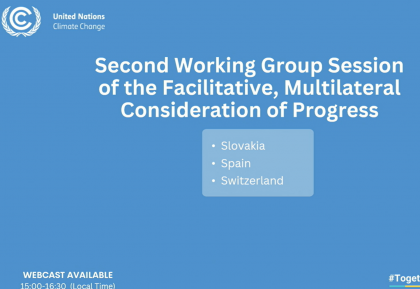
On Saturday, 15 November 2025, Slovakia made its mark in the history of international climate policy by taking part in the second FMCP under the Paris Agreement during COP 30 in Belém. Slovakia, placed in the second slot together with Spain and Switzerland, followed immediately after the first group of countries that day. That first FMCP slot included representatives of the European Union, South Africa, Côte d’Ivoire, Finland, Kazakhstan and the Netherlands. It is worth noting that pilot assessments under this mechanism had already been carried out in June in Bonn during the technical sessions ahead of COP 30, involving Andorra, Guyana and Panama.
The FMCP (Facilitative Multilateral Consideration of Progress) represents the global finale of the transparency process, which is essential for fostering trust among Parties to the Paris Agreement. It is the culmination of almost a year of scrutiny that began with the submission of the Biennial Transparency Report (BTR) in December 2024, followed by an in-country review and written questions from Parties during the autumn of this year.
This mechanism functions as a public, collective examination in which Parties assess how effectively they are fulfilling their national climate commitments. The purpose of the FMCP is not to criticise but to promote transparency and facilitation, helping to identify good practices, obstacles and support needs so that climate action can become more effective and more credible.
How Slovakia’s Review Unfolded
During the FMCP, Slovakia’s representatives presented the key findings from the country’s first BTR. This presentation, also available on the UNFCCC website, subsequently served as the basis for the dialogue with other countries.
Slovakia received two official questions that reflected international priorities and interest in the specific aspects of our report. The United Kingdom asked how local authorities are involved in decision-making and processes related to climate mitigation. Slovakia explained that municipalities, local authorities and the relevant ministries are included in decision-making through consultations during the preparation of strategies and required legislation, with efforts being made to ensure cooperation in their development.
The second question came from Lebanon, seeking clarification on the exceptionally high emissions recorded in 2021. Emissions that year were strongly affected by economic developments linked to the Covid-19 pandemic.
The responses and the wider discussion during the FMCP form an important part of the Enhanced Transparency Framework. They will play a key role in future global assessments of progress in tackling climate change.

